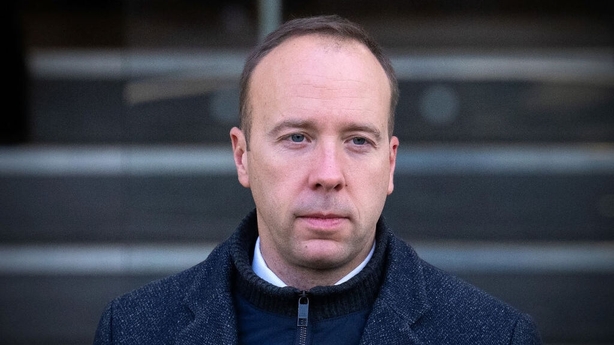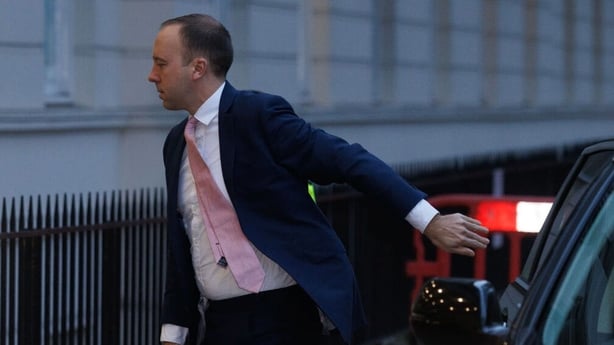Businessman Alan Sugar has been hosting BBC TV show The Apprentice for more than 20 years and is well used to watching the group behaviour of people under pressure.
Once, when he noticed the candidates ganging up on one of the contestants, he remarked that in his experience this either meant there was good reason for it or people were trying to cover themselves.
It is a question that could be asked about the criticism made against Matt Hancock, who was Britain's secretary of state for health and social care during the Covid-19 pandemic.
Mr Hancock has been criticised by a succession of witnesses at the UK Covid-19 Inquiry.
He was portrayed as a liar who consistently misled other cabinet members and health officials about how the response to the pandemic was going.
However, his supporters have been briefing journalists saying he is being made the scapegoat.
On Thursday, he came to the televised inquiry to answer the accusations in person, ironically with experience of appearing on two different reality TV shows under his belt.
And when giving evidence, he certainly did portray himself as a wrongly maligned scapegoat.

The inquiry heard how, in WhatsApp messages, Mr Cummings called Mr Hancock a "proven liar" who should not be in his job.
But Mr Hancock, in his evidence, described Mr Cummings as a "malign actor" who held morning meetings during the pandemic which excluded him.
Mr Cummings also decided that then prime minister Boris Johnson did not have to be informed of all decisions and was involved in a "power grab", he said.
In his evidence, Mr Hancock said that any specific allegation of him telling lies had been shown not to be true.
The most famous accusation against him concerned his comment in May 2020 that government "tried to throw a protective ring around care homes," when in fact elderly people were being discharged from hospital into care homes that April without being tested for Covid.
A total of 20,000 care home residents died during the first wave of the virus and the UK high court has already ruled that the government's actions were unlawful, following an action brought by relatives of two of the deceased.
Mr Hancock admitted that, in retrospect, the "protective ring" claim was misleading.
But he said the official medical view at the time was that only symptomatic Covid patients could transmit the virus as had been the case with SARS.
Read more:
Hancock criticises 'toxic culture' in UK government during pandemic
Hancock was warned that 'focused effort' was needed for care home testing
He was also worried that elderly patients were more at risk of contracting the virus if they remained in hospital.
"Nobody has yet brought to me a solution for this problem that I think even with hindsight would have resulted in more lives being saved. If there is one I want to hear about it because it is important that lessons are learned" he said.
Other critics include Mark Sedwill, a former cabinet secretary, Helen McNamara, a former deputy cabinet secretary and Patrick Vallance, the then chief scientific adviser.
Each said the health secretary continually said everything was going well and plans were in place, when in fact they were not.
There was also criticism of his running of the department.
The main thrust of Mr Hancock's evidence was that once others in government realised the scale of the problem posed by Covid, they turned around and blamed him despite the fact that he was the one who had tried to warn them about it.
Mr Hancock replied that plans were in place but were based on a 2011 document and were not adequate.
However, Mr Hancock said, contrary to the impression created by other witnesses, it was he who was trying to "wake up" the government to the dangers of the pandemic.
He said 30,000 lives could have been saved if the first lockdown had been called three weeks earlier in 2020.
Others were arguing against lockdowns because of the damage to the economy including Rishi Sunak, according to one of Mr Hancock's messages.
But Mr Hancock said that even if the only concern was the economy, then early and hard lockdowns would prevent longer lockdowns in the future and more damage to the economy.
However, he could not find written evidence to support his claim that he had urged Mr Johnson to go for a full lockdown on 13 March that year.
The main thrust of Mr Hancock’s evidence was that once others in government realised the scale of the problem posed by Covid, they turned around and blamed him despite the fact that he was the one who had tried to warn them about it.

He also confirmed that he accepted responsibility and resigned for a breach of his own lockdown rules in June 2021 after being caught on CCTV kissing his aide Gina Coladangelo in his office.
In her recent book, 'The Plot’, former culture secretary Nadine Dorries claimed there was a conspiracy in the leaking of a still from the CCTV to The Sun newspaper.
She claimed that the camera had been turned around to face into the office instead of towards the balcony, which was the usual setting.
Others who have spoken up for Mr Hancock include Michael Gove, Secretary of State for Levelling Up, who told the inquiry that Mr Hancock displayed "wisdom and foresight’ in his handling of the pandemic.
However, Mr Hancock does have 'form' when it comes to making claims that turn out not to be true.
He claimed that Britain became the first to develop a vaccine in 2020 because Brexit meant it was not held back by EU rules.
This was quickly contradicted at the time by the UK Medicines and Healthcare products Regulatory Agency, which pointed out that the authorisation process had in fact been carried out under EU law because Britain was in still the transition period.
But being accused of making statements that turn out to be untrue, claiming things are going well when they are not and breaching Covid lockdown rules do not seem to be enough to make someone a complete outcast in the Tory party given its recent history.
The Covid-19 Inquiry will not be apportioning blame, unlike a reality TV show where a contestant is 'hired' or 'fired'.
But its future rulings may shed some light on how much responsibility Mr Hancock should accept for mistakes made during the pandemic.







